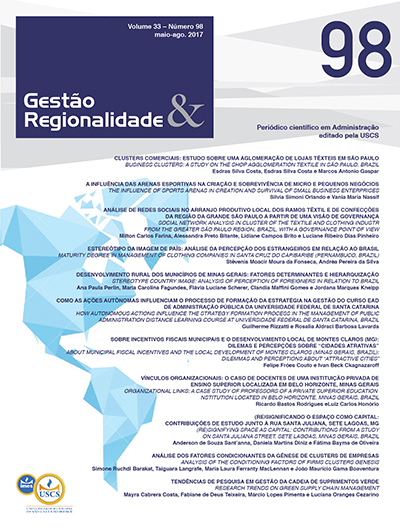Business clusters: a study on the shop agglomeration textile in São Paulo, Brazil
DOI:
https://doi.org/10.13037/gr.vol33n98.3336Abstract
This study aimed to identify the main features of a commercial cluster model located in Brás neighborhood, in the city of São Paulo, Brazil, and to characterize the different types of textile industries in the region. Brás neighborhood has a strong appeal to models of commercial clusters, highlighting its continued flow of people and high number of stores as well as being an economically important region for the city of São Paulo. This is a descriptive study based on the model proposed by Zaccarelli et al., and seeks to identify the cluster formation and the presence of a supracorporation agent (supracorporate governance). A questionnaire was applied to forty shopkeepers in the area with questions regarding factors that influence the permanence of traders in the current clustering model. The following factors were highlighted in the questionnaire: balance between stores (with no privileged positions), complementarity by using by-products, business cooperation and community’s culture adapted to the cluster. However, other principles were little valued: evolutionary character by introducing technologies and strategy result guided for the cluster. Advantages perceived from the fundaments proposed by Zaccarelli et al. characterize the studied region as a commercial cluster with traces of development and competitiveness.
Keywords: Business cluster; textile industry; local business features.
Downloads
Downloads
Published
How to Cite
Issue
Section
License
Autores que publicam nesta revista concordam com os seguintes termos:
- Autores mantém os direitos autorais e concedem à revista o direito de primeira publicação, com o trabalho simultaneamente licenciado sob a https://creativecommons.org/
licenses/by-nc-nd/4.0/ , permitindo o compartilhamento do trabalho com reconhecimento da autoria do trabalho e publicação inicial nesta revista. - Autores têm autorização para assumir contratos adicionais separadamente, para distribuição não-exclusiva da versão do trabalho publicada nesta revista (ex.: publicar em repositório institucional ou como capítulo de livro), com reconhecimento de autoria e publicação inicial nesta revista.
- Autores têm permissão e são estimulados a publicar e distribuir seu trabalho online (ex.: em repositórios institucionais ou na sua página pessoal) a qualquer ponto antes ou durante o processo editorial, já que isso pode gerar alterações produtivas, bem como aumentar o impacto e a citação do trabalho publicado (Veja O Efeito do Acesso Livre).
























